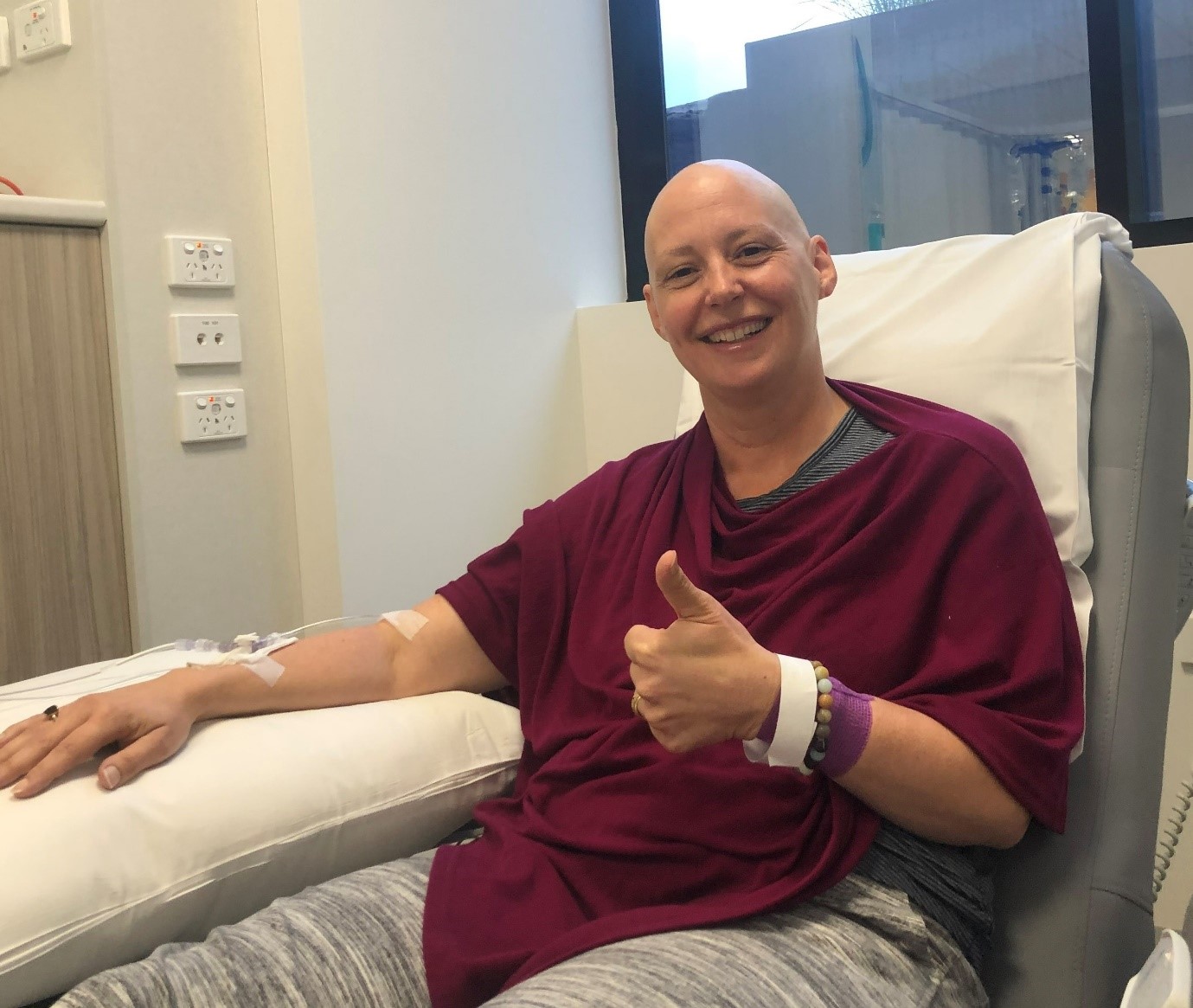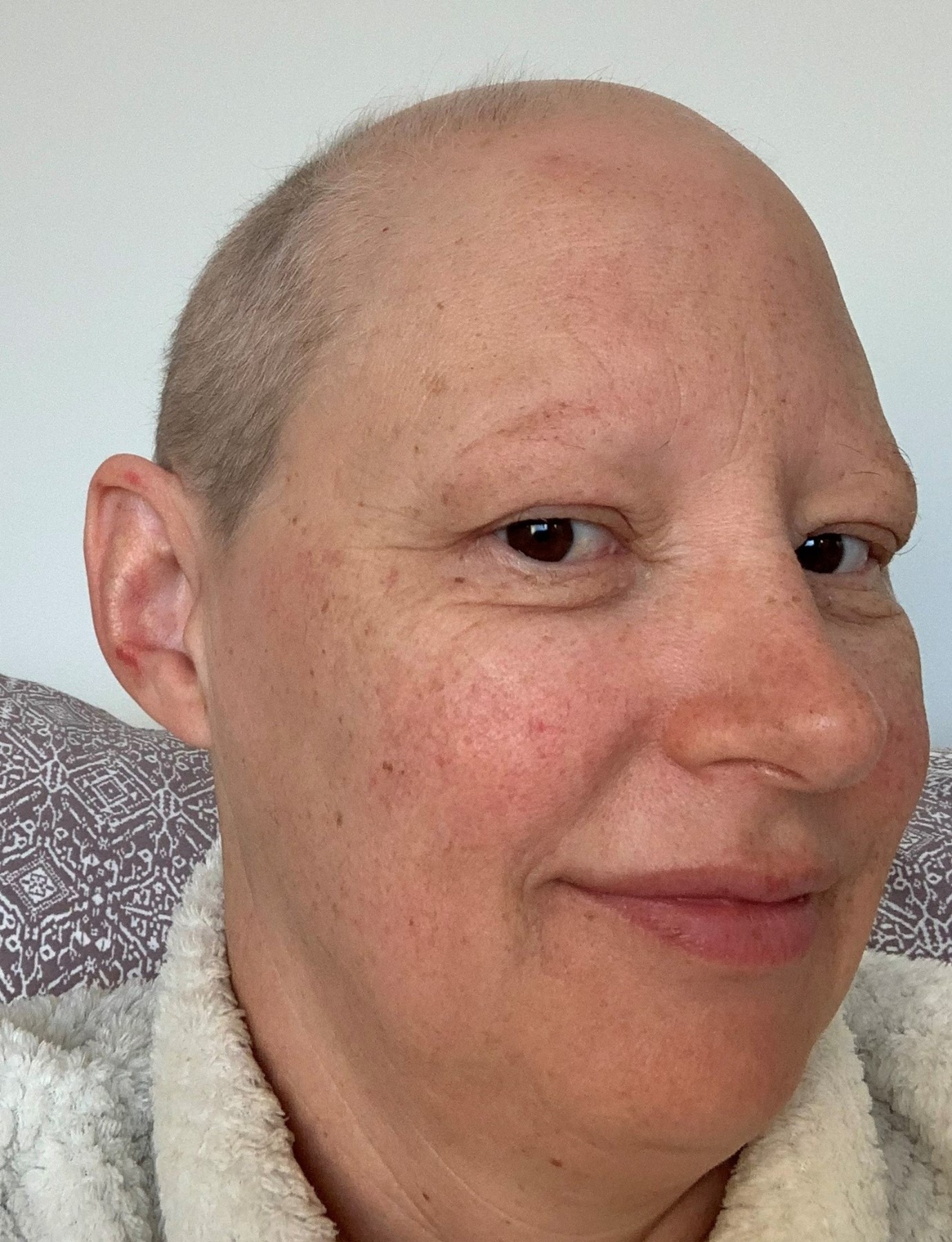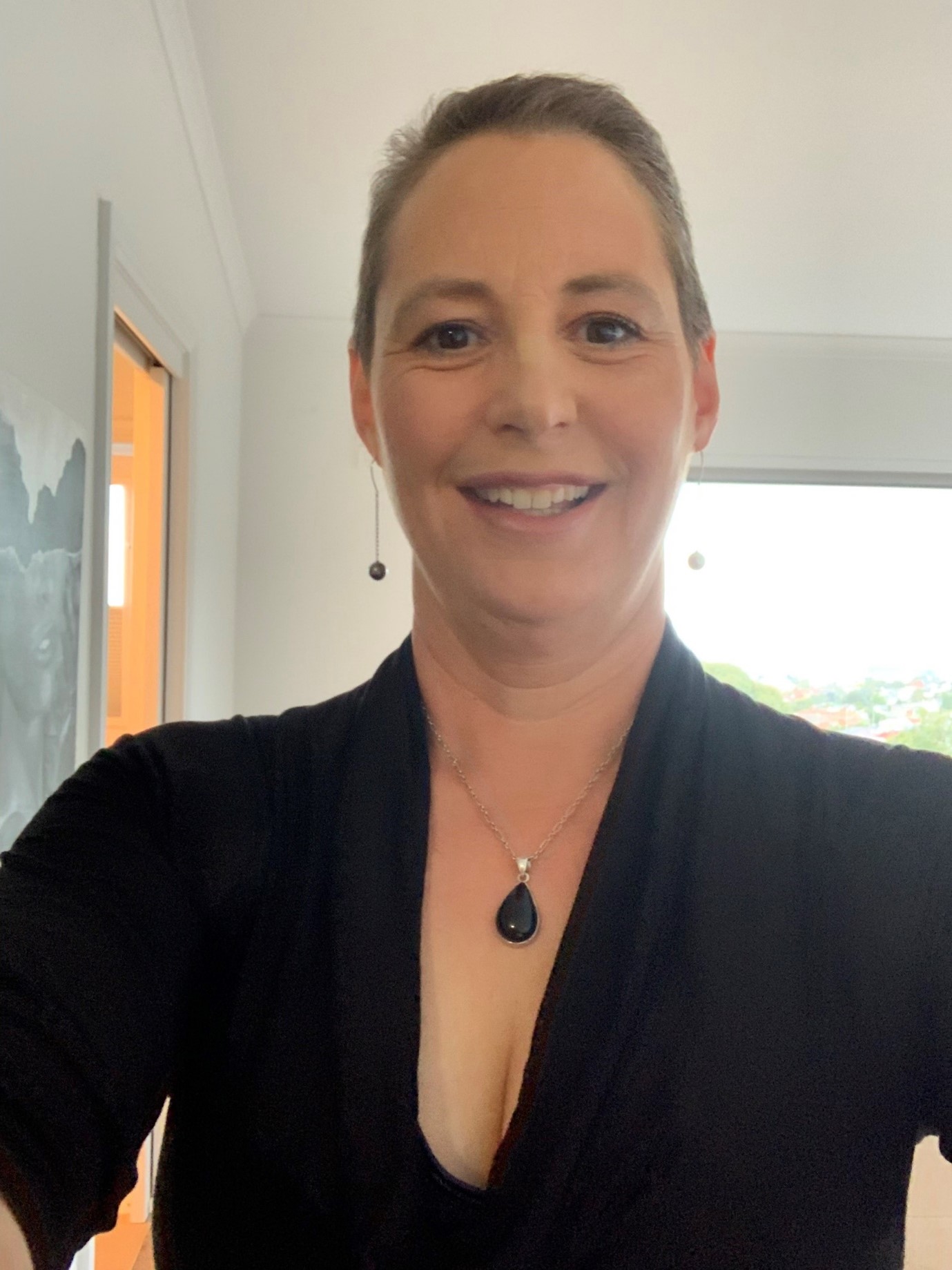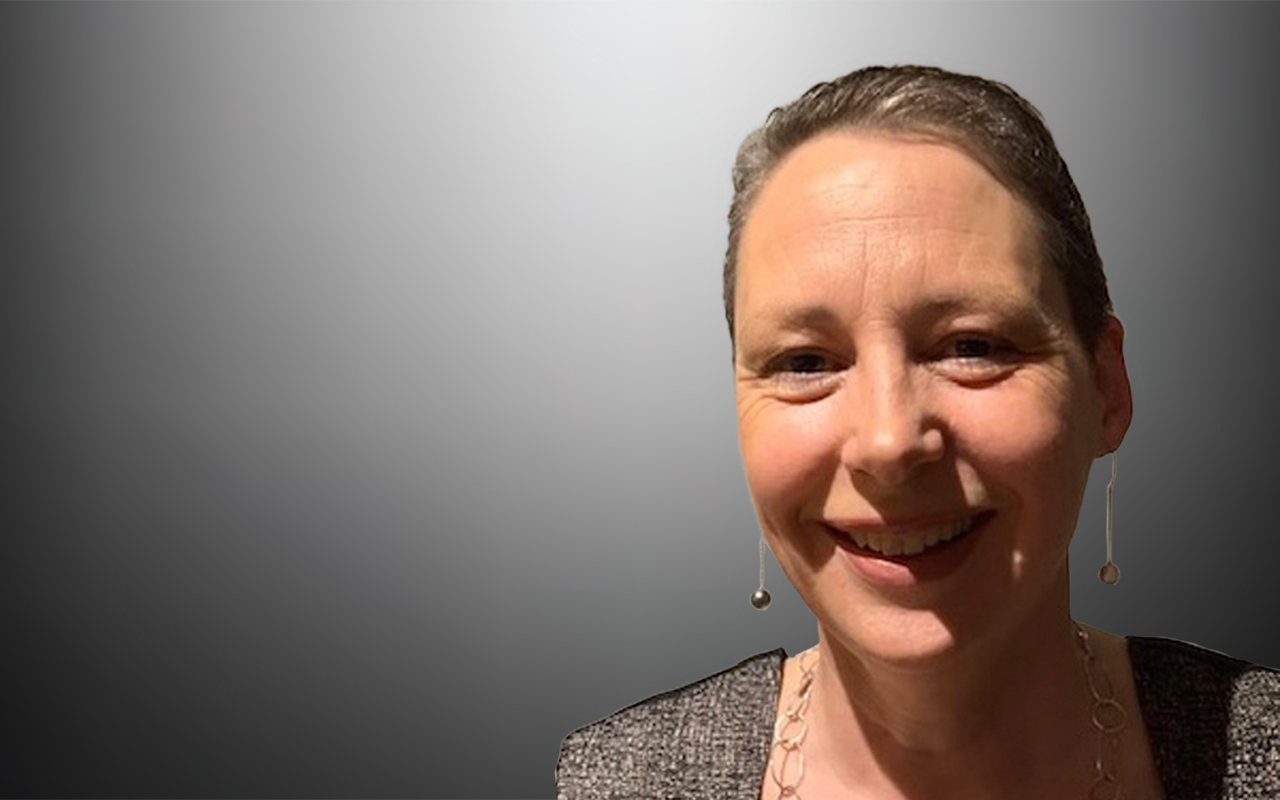CARING for patients at their most vulnerable has a way of cutting through life’s worries. However, I was unprepared for my own vulnerability when I was diagnosed with grade 3 triple negative breast cancer at the age of 47 years. Being a patient with cancer is the hardest challenge I have ever faced.
Rolling over in bed at 3am, my hand landing on a hard lump in my breast instantly woke me with a feeling of dread that changed my life forever. I lay there until morning trying to tell myself it was just a cyst, but my medical training told me otherwise. Years of treating breast lumps, reassuring the worried and arranging urgent scans and biopsies prevented me from being falsely reassured. Suddenly, it was me with the breast lump and the crazy cancer journey began. At first light, I woke my husband and we made a plan. First, we had to get our daughter to hospital for day surgery for complications after a dislocated elbow. Next, I rang my GP and made an urgent appointment.
Reassuring my daughter and admitting her to hospital provided distraction but only intensified my feeling of disbelief. My husband, also a doctor, and I kept exchanging glances filled with silent meaning. Suddenly, all the years of emergencies and breaking unexpected news faded into the background as I faced my own mortality. As doctors we are trained to save the lives of others. We still have a long way to go to deal with all the challenges that come with saving our own. The transition from doctor to patient is a huge task, and when it happens overnight, it blindsides you in a way that takes extraordinary strength and determination to manage.
Discovering the breast lump was followed by more investigations and specialist appointments than I had ever experienced. Treatment options are overwhelming at a time when even the possibility of cancer seems incredulous. I had no family history of breast cancer and no modifiable risk factors. Breast cancer was something that I can honestly say had never crossed my mind. I enjoyed work, had great family and friends and was fit and healthy, running 5–10 km several times a week. Knocked sideways does not begin to do justice to how I felt.
My GP arranged an urgent breast ultrasound and mammogram. The mammogram happened quickly, with me confidently trying to tell myself there would be nothing to find. The ultrasound, however, brought down my thinly veiled bravery. Looking at the ultrasound as the sonographer scanned over the lump it was obvious it was something to be concerned about. My concern was only heightened when a lengthy examination of my axilla found further abnormalities. The radiologist came in and recommended a core biopsy of the breast lump and a fine needle aspirate of axillary lymph nodes.
I held it together while we arranged for biopsies the following morning, but I fell apart as I walked down the corridor of the hospital desperate to avoid seeing anyone I knew. Tears flowed freely. As I drove home, I openly wept. Medical knowledge is a privilege, but it does not allow you the time to believe things may be okay and takes away the opportunity for someone to break the news to you gently.
While I was having the investigations, my husband was able to explain to our teenage daughter what was happening. Words were not necessary as I walked through the door sobbing. I was embraced by my family and comforted before we sat down and tried to get our thoughts around what was happening. We escaped for the weekend to enjoy a beautiful family bushwalk. With every step, I marveled at how I could be so fit and well and yet have cancer that had already spread to my lymph nodes. Knowing things medically and experiencing things personally are two vastly different perspectives.
The biopsies confirmed grade 3 invasive breast carcinoma with spread to the axillary lymph nodes. I was unprepared for the week that followed, with further staging investigations and visits to a breast surgeon and an oncologist. I went to work in a daze and told them I would be needing some time off. By the end of that week, I was booked to begin chemotherapy.
The tests further revealed triple negative breast cancer with a very high Ki-67 (proliferation index > 80%). Suddenly, it was not just about dealing with breast cancer but desperately hoping it had not spread beyond my lymph nodes. Survival statistics of metastatic triple negative disease made for terrifying reading.
The moment I learnt there was no distant spread was a moment of sheer relief and joy. It was so strange to feel thankful for only local spread to lymph nodes, yet this is the perspective that life-threatening cancer brings.
I was due to start chemotherapy in 2 weeks, but this would be a few days before Christmas. I made the first of many active choices that felt right for me and gave me a sense of some control. I asked if we could wait a week. I needed time to process and prepare.
It was a great decision. I spent a superb Christmas with my family, feeling well. We ate, laughed and cried; our lives forever changed.
It is safe to say we were unprepared for the immediate onslaught of dose-dense doxorubicin and cyclophosphamide chemotherapy, but at least I felt ready to start rather than feeling stunned and scared. I feel this made an enormous difference to my perspective and how I managed with all the chemotherapy side effects.
I approached chemotherapy as I imagine many high performing, task-oriented doctors would. I learnt how to manage all the side effects and did everything I could to survive. I meditated daily and during chemotherapy. I managed 16 cycles of chemotherapy without a port and no major complications. I walked in nature every day except for the 72 hours after the chemotherapy infusions, when I needed rest and ice packs to hands and feet to minimise the risk of hand-foot syndrome. I even managed a run after the first few doses knowing the benefits of vigorous exercise. My hair fell out after the second round and I embraced my bald head.

The twelve doses of paclitaxsol were better tolerated than the doxorubicin and cyclophosphamide, but each week came around so fast with no time to recover in between. Deconditioning despite daily exercise occurred rapidly. Combined with instant chemotherapy-induced menopause, mouth ulcers, constipation from antiemetics, sensitive skin, poor sleep from dexamethasone, and intense fatigue, it was a lot to manage. Just as I got some grey hair growth back on my scalp, I had lost all my body hair and my eyebrows and eyelashes fell out.

I had seen many patients through this journey. My medical knowledge and experience did not prepare me. I now know what they were not telling me. I had so much to learn! I also realise symptoms fade into the background when you are trying to survive.
After 5 months of chemotherapy, I tried to get some fitness back before surgery. The assistance of an exercise physiologist and cancer rehabilitation physiotherapist were invaluable, and I would like to see all cancer patients able to access them.
I was fortunate to have an amazing team and 5 months of chemotherapy to decide what treatment I wanted and plan for it. A month after finishing chemotherapy, I had a mastectomy, complete axillary lymph node dissection, and immediate autologous DIEP (deep inferior epigastric perforators) breast reconstruction.
Immediate autologous reconstruction meant I woke from the operation still feeling like I had a breast. Immediate breast reconstruction rates are low in Australia and more women requiring mastectomy for breast cancer should have access to this as an option. Access to the decision-making tool for breast reconstruction, BRECONDA, was valuable.
When you are busy saving your life, it is easy to believe losing a breast does not matter. However, the daily reminder of mastectomy can have more of an effect than just physical scars. Recovery has been slow and ongoing complications are part of my life now, yet the moment I learnt I achieved pathological complete remission was bliss. It was the miraculous news we had given our all to achieve.
As I return to work, I wish to use my experience to help others. The perspective of the patient journey I have gained will forever change me as a doctor. Being a patient has taught me so much more than my medical training could prepare me for. Strength, hope, determination, patience, courage and humour have been required. Understanding the fear, shame, guilt and embarrassment that accompanies the experience of doctors who become cancer patients is also important.
This patient perspective, through the lens of a doctor as the patient, will hopefully provide insights and reflection for all health professionals.
Dr Emma Warnecke is an Associate Professor in the Tasmanian School of Medicine at the University of Tasmania.

The statements or opinions expressed in this article reflect the views of the authors and do not represent the official policy of the AMA, the MJA or InSight+ unless so stated.

 more_vert
more_vert
What powerful (& empowering) words Emma. You have shown that to be vulnerable is not a weakness but is actually a super power. It allows those around us know to lean in, take our hand & support us when we need it the most xx
Thanks for sharing Emma, powerful story in many regards. Thanks for letting us in
Emma, thank you so much for posting this story of your journey through breast cancer. Although I am just at the beginning of this journey, I felt like you are telling my story exactly as I have experienced so far. Hearing your whole story has given me some insight into the journey, and the hope, I still have ahead of me. This helps me to understand it all much better, especially knowing others have been through it all too.
Thank you Emma for sharing your journey- your story gives me so much hope! I’m 31 years old living in Melbourne and I have recently been diagnosed with TNBC and have a lymph node that is positive after FNA. I had my second dose of paclitaxel yesterday and am also am doing self funded immunotherapy. It’s been so hard and there are so many scary stories out there but you sharing this gives me so much reassurance that life can get better. Thank you
Through your story I re-lived my last year which was very much the same. On maintenance now. Wishing us all the very best. Cheers
Dear Emma
Thank you for sharing your personal journey during this time I wish you a full recovery and I am sure your sharing and honesty will assist others whom may be going through the same journey.
Thank you for sharing your story it is very generous of you, sharing your story which I am sure will help others deal with their own journey I wish you all the best in your recovery and I admire your positivity, courage and acceptance in what you are going through and I am sure you will be a guiding light for others. I wish you a full recovery as you go through this journey. Rosie Smith
Thank you Emma for having the courage to share your story. I am sure it will help others in the same position immensely, especially with the holistic view of treatment.
Hi Emma,
Thanks for sharing your story. So very happy for your outcome. Truly heartfelt, it brought tears and joy to my heart. Very inspiring.
I saw myself in Your Story as, My Story as a survivor is similar. I too was diagnosed TNBC last year at 46 with a teenager. I completed my final surgery (breast reconstruction diep flap) a month ago. So my journey now is just healing. Giving God thanks everyday for my outcome. Can’t wait to share my story.
Thanks again!
Dear Emma
Thanks for sharing your journal, which will definitely help us to become more understanding doctors.
Hope you stay well. All the best! Thank you!
Liwei
Emma we are so touched by your beautiful story! Thank you for sharing your journey and wisdom.
You are honest and brave! You are an inspiration!
When we experience ill health, we become better doctors too – it gives us greater insight and empathy in understanding our patients journey and their suffering!
Thank you Emma, you look wonderful and vibrant!
I am so touched by all the people who have contacted me and honored that sharing my story has allowed others to share their story. Personal narratives are so important in aiding understanding. Thank you all for being so kind and generous with your words of encouragement.
Thank you for writing and sharing your story. Your perspective is really helpful for both patients and physicians. May you stay well.
Thank you for being generous enough to share your story with us all Emma. As I am now 2 years from my cancer diagnosis, I still find it very hard to balance the doctor in me and the patient I need to be. I have found that the culture of medicine around this doesn’t really help us be The Patient. The fear, shame, embarrassment and lack of understanding from colleagues is very real and ongoing. We must be brave about sharing our stories. You look fantastic.
Dear Emma,
Thank you for sharing your story. Like you I was also diagnosed unexpectedly with cancer, mine was oesophageal cancer with a couple of positive lymph nodes. Like you, the survival statistics for my type and stage of cancer are terrifying. Thankfully 5 years after my diagnosis things are looking positive. I agree with you that as task- oriented doctors we have a lot of tools to manage the treatment phase, and I, like you, focussed on meditation, exercise and diet to get through. I found that I was not so well equipped to deal with the recovery/ healing phase of the process. There are no guidelines to tell you how to make that transition from the illness towards life after cancer, and of course it is a very individual process. I agree that some form of physical therapy/ cancer rehabilitation should be a routine part of every patient’s treatment, but I would like to add that counselling with a professional experienced in dealing with cancer patients should also be offered routinely. With best wishes,
Thank you for sharing your story so openly: you may well have saved a couple of lives. Medical women ( and men) are reminded that we are human and just as likely as our patients to get breast cancer. Breast screening is so important in catching cancers early: I hope most of us are participating in a screening program.
I wish you good health going forward!
It takes great courage to make the journey you have, especially given your knowledge as a physician, as you state, “… it does not allow you the time to believe things may be okay and takes away the opportunity for someone to break the news to you gently.” It takes extraordinary courage to share a very personal story openly, with candor. You are an inspiration. Thank you, Emma.
Dear Emma,
Thank you for sharing your experience with us. I’m confident that your story will prompt others in our profession to not put their own health needs aside and to attend for screens, just as we remind our patients to do.
Your story connects us to our vulnerability. It’s ever so important to acknowledge this because we become so absorbed in our patients’ lives, we overlook our own self care.
Thank you again Emma, all strength and health to you.
I’m booking my overdue mammogram now.
Dear Emma ,thankyou for sharing your story.I have recently given a talk to our doctors’ group on Drs’ health. Your story touched us with its honesty and vulnerability.Kind regards David doolan
Thank you for sharing your story. I am sure there was more than one tear for every word above. For me and for any of our colleagues who have spent time on the other side of the consulting desk, it reminds us again of our own humanity and the humanity of each and every one of our patients. I wish you the very best